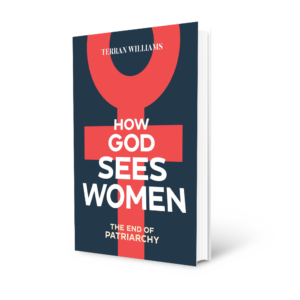
Terran Williams shares a similar church background to me. We have both spent a very long time within a partnership of churches that were very closely aligned in culture and theology. Because of this shared background, I suppose I was expecting a certain mode of engaging with theology and Scripture that is typically Evangelical. But his book How God Sees Women – The End of Patriarchy is very different in its style and approach. The book adopts the style of a new kind of theological methodology, a new kind of ‘Evangelicalism’. It is a sociological critique wrapped in theology.
My biggest critique of How God Sees Women is that the main thrust of the argument for Egalitarianism and against Complementarianism is not founded upon Scripture. His argument is mostly Sociological and not Theological. He aims to make the case using sociological critique that Patriarchy is evil and that, for Christians, there are alternative ways of interpreting Scripture that will allow them to dispense with Patriarchy. But this is very different from formulating doctrine from Scripture using responsible exegesis.
The Methodological Approach Used in the Book
Terran Williams’ central argument is that throughout Church history, the Church has believed the lie that women are inferior to men and therefore they are not competent to lead. After the advent of the Women’s Liberation Movement (feminism), the Church was forced to reconsider its assumptions about the inferiority of women and it discovered that the feminists were right!
He argues that because neither God nor the Scriptures teach us to view women as inferior in any way, the original premise for the subordination of women has also been removed. So there is no longer any justifiable reason for the ongoing ‘suppression’ of women, ie. Patriarchy.
The first three chapters of the book are painful to read as he goes through a historical survey of all the abusive, misogynistic opinions of leaders within the Church throughout the ages. It grieves the soul to read story after story of women being devalued and degraded and treated as less-than-human, as though they were in some way the more sinful of the two sexes. His condemnation of these misogynistic attitudes throughout history is 100% valid and we can all utter our hearty – Amen!
There is, however, a ‘straw-man’ argument being made here. Patriarchy and misogyny are not the same thing. We can all condemn misogyny in the strongest terms (and we should!), but that does not spell the end of patriarchy, because the Complementarian view of gender relations is not founded upon the lie that women are somehow inferior. The Bible teaches both that women are equal with men and that leadership should be male.
“Patriarchy” has become a dirty word, but we need to redeem it as Christians because it is a Bible word.
“Patriarchy” has become a dirty word, but we need to redeem it as Christians because it is a Bible word. In fact, the very God whom we love and worship is revealed as our Heavenly Father. That makes God our patriarch, because ‘patriarch’ is defined as ‘the rule of the father’.
As you begin reading the book, you stumble across a curious ‘trigger warning’ on page 22, which I think hints at the ‘new kind of Evangelicalism’ I referred to earlier: “By using the terms male and female, I echo Lucy Peppiatt who, in the introduction to her excellent book, says, ‘I am aware that by constantly referring to male and female as made in God’s image… this language excludes those who see themselves as neither male nor female. … [T]his book is dealing with a very specific situation in which expectations of differences in forms of ministry and roles in heterosexual marriage for men and women are rooted in assumptions about differences in sex and gender between male and female. Thus, I will continue to use this language, despite its limitations, to address this particular situation.’” (pg.22)
This kind of language regarding gender is very familiar to the modern world of the Social Sciences. The person reading this book who is not very familiar with the modern Sociological discussion on sex and gender is going to find it a difficult read.
If you are eager to find out how Williams engages with the Scriptures on the question of ‘How does God see women?’, you will need to first get through about 60 pages (the first three chapters of the book) of sociological critique. On page 52 he asks this question regarding Complementarianism: “Still, if it is a flawed position, why has it experienced such ascendency, nonetheless?”
Notice the assumption: ‘if it is a flawed position’. The basis of this assumption is not Scripture (he has not gotten to his exegesis yet), the basis of the question is the detailed survey he has given of the misogynistic viewpoints of church leaders throughout the ages.
Although the Bible does clearly teach male headship, it gives absolutely no warrant for misogyny. Misogyny is a demonic, sinful attitude that has no place in God’s Kingdom.
It was God’s design to institute leadership within all spheres of society: family, church, work and government, and these were given for our good. Without good leadership, there will be an inevitable decay within all of these spheres. Male leadership is not premised upon the lie that women are inferior to men, it is premised upon God’s choice and God’s design.
Male leadership is not premised upon the lie that women are inferior to men, it is premised upon God’s choice and God’s design.
Engaging With the Scriptures on the Issue of Women and Leadership
Before Williams turns to look at the Scriptures he says, “from the mid-1960s to the late 1980s, there had been a healthy and open debate in which both sides argued about the most likely interpretation of the few disputed texts.” (pg. 65)
Ironically, it is the hefty amount of time and deliberation it requires from Williams to systematically reinterpret the avalanche of Scriptural data seeming to say the exact opposite of the argument that he is making which demonstrates how much the Bible actually has to say on this topic.
The Analogy for Marriage Drawn from the Trinity
Williams tells the story of when he was still actively involved in the leadership of a church that held to a Complementarian view of leadership, both he and his wife found the analogy of the trinity to be a compelling model for the marriage dynamic. From the relationship of the three persons within the trinity, we can affirm both their equality in value as persons and the differentiation of their roles within the Godhead.
This seems to be a rather powerful analogy for the marriage dynamic: as Christ is equal with the Father in every way and yet subordinated to Him in authority, the wife is in no way inferior to her husband, yet is subordinated to his authority.
But Williams then goes on to try to refute this idea with the following words: “the analogy is fatally flawed. Nowhere does Scripture teach us to model our submission to any human (whether to pastor, king, spouse, or parent) on Jesus’ submission to the Father.” (pg. 59)
But this is simply not true. In 1 Corinthians 11, which is dealing specifically with the topic of gender dynamics within marriage and church, Paul says, “But I want you to understand that the head of every man is Christ, the head of a wife is her husband, and the head of Christ is God.” (1 Corinthians 11:3)
There is a very clear reference to a chain of authority within God’s Kingdom. Within that chain, a woman’s submission to her husband is synonymous with Christ’s submission to God. And note the use of the present tense, ‘the head of Christ is God’. This was not a temporary arrangement while Christ was on earth. He continues to live out His relationship with the Father in submission to His authority.
What is clear about Williams’ conception of submission is that he cannot conceive of any kind of ‘equality’ between men and women within marriage or within the church in which women are excluded from leadership. For him, this is the exact opposite of justice and fairness. But if it is true that Christ is fully equal with the Father and yet also subordinate to Him, then Williams’ conception of what equality can look like must be wrong.
According to Williams’ thinking, if women are excluded from the highest forms of authority, they will never be able to fulfil their highest potential. He believes that in order for any person to fully realise their potential in society, they must have the opportunity to ascend to the highest echelons of power and authority. Therefore, it is those with the highest authority in society that are able to fulfil their highest potential.
The problem with this way of thinking is that Scripture teaches us the exact opposite. The consistent message (and warning) of Scripture is that we must be faithful to glorify God with our good deeds within whatever station God has put us, and to work at it as unto the Lord. The most extreme example of this is perhaps in Ephesians 6, “Slaves, obey your earthly masters with respect and fear and sincerity of heart, just as you would obey Christ. And do this not only to please them while they are watching, but as servants of Christ, doing the will of God from your heart. Serve with good will, as to the Lord and not to men, because you know that the Lord will reward each one for whatever good he does, whether he is slave or free.” (Ephesians 6:5-8)
Slaves were often born into their low station in life, but they are taught here that God is a rewarder of the good that we do, regardless of whether we are powerful or powerless. The rich and the powerful in this life receive the most warnings in Scripture, because of the grave danger that their power might corrupt them and cause them to forfeit eternal life.
Our calling is to be a light in the world, and that light is shone through our good deeds and our proclamation of the Gospel. There is no limitation put on our potential to shine by our level of authority. God has designed women to fulfil a role and function in society that does not require them to be the highest authority.
Furthermore, the consistent pattern and warning from Scripture is that those who ‘grasp higher’ than the station that God has assigned to them are actually falling victim to a spirit that is completely contrary to the Spirit of Christ. Satan and his angels grasped higher (Jude 1:6) and were judged, and Adam and Eve grasped higher because they wanted to ‘become like God’ (Genesis 3:5) and were also judged for it.
God’s Design for Marriage Revealed in the Genesis Account
A key component in Williams’ Scriptural argument for the eradication of patriarchy is his contention that male headship was not God’s original design; it was a result of the Fall. Therefore, because Jesus has removed the curse of the Fall, male headship has also been done away with.
Ironically, I 100% agree with him when he says, “the question is whether we should challenge the complementarian statement that male-female authority-submission is part of pre-fallen creation. If it is, then it should be commended to all people, and especially commanded to God’s people.” (p.g 68)
Essentially what he is saying here is that if it can be shown that Adam’s headship in relation to Eve was part of God’s good design pre-fall, then that is the end of the argument. So let us take a look at each argument that is made from Genesis for male headship and evaluate Williams’ rebuttal of these arguments in turn.
1. Adam Was Made First, Then Eve
“I do not permit a woman to teach or to exercise authority over a man; rather, she is to remain quiet. For Adam was formed first, then Eve;” (1 Timothy 2:12-13)
The first argument that is made for male headship is a reference to the fact that Adam was made first. This argument rings hollow in our modern, Western culture, because we don’t attribute much weight to the status of the first-born son. In the Biblical context, however, there is immense weight given to the authority and responsibility of the first-born son. It is a principle referred to in theology as ‘primogeniture’. Although it is a concept that may be foreign to our culture, it is a crucial concept to understand if we are to properly understand the Scriptures. For example, there is immense weight attributed to Christ as “the image of the invisible God, the firstborn over all creation” (Colossians 1:15). When you read this passage, you realise the significance of His status as first-born and how that gives Him a unique authority.
So in the passage quoted in Timothy, Paul is directly and unequivocally invoking this principle to justify the authority that men carry, ‘For Adam was formed first’. So how does Williams respond to this? He begins by saying, “for now, let me say that it is not entirely clear what point Paul is making [in 1 Tim 2:13]”. (pg. 71)
He then goes on to say that this does not demonstrate Adam’s authority over her by virtue of primogeniture. He says that Adam was created first, “to demonstrate to Adam how desperately alone, incomplete and inadequate he is without Eve”. (pg.71)
When I read this rebuttal, I’ll be honest, I was very disappointed. I will let you as the reader evaluate the strength of this response. For my own part, I can’t conceive how it is possible to so easily dismiss Paul’s own rationale that Adam’s ‘first-born’ status somehow endows him with unique authority.
If Williams disagrees with the principle of primogeniture or thinks it is somehow unfair, he is entitled to that opinion, but to disregard that this is what Paul is invoking here seems to me to not take Paul’s words on their own merit.
2. Woman Was Made ‘From Man’ and ‘For Man’
In 1 Corinthians 11, the context again dealing with gender roles within marriage and the church, Paul says, “Neither was man created for woman, but woman for man. For this reason a woman ought to have a sign of authority on her head, because of the angels.” (1 Corinthians 11:9 -10)
It is earlier in the same passage where Paul says the above-referenced passage, “But I want you to understand that the head of every man is Christ, and the head of the woman is man, and the head of Christ is God.” (1 Corinthians 11:3)
Paul is referencing the creation passage once again to justify male leadership. I’m not sure what more to say about this. To me, it seems self-evident what point he is trying to make and how he is justifying it. Again, I will let you as the reader be the judge of what point he is making.
Williams’ responds by saying, “he is not arguing for the subordination of men to women [sic]. Rather he argues for the interdependence of the genders” (pg. 72)
He references vs 11 as justification, “In the Lord, however, woman is not independent of man, nor is man independent of woman.” (1 Corinthians 11:11)
I would agree with Williams that, in vs 11, Paul is giving a reminder that the genders are interdependent. But this certainly does not undermine the point that he has just made about authority. Paul is bringing a necessary qualification, to say that although the man may carry authority, the genders are interdependent. This is not an either/or, it is a both/and.
Paul is bringing a necessary qualification … although the man may carry authority, the genders are interdependent. This is not an either/or, it is a both/and.
3. You Shall Be Called ‘Woman’
‘The man said, “This is now bone of my bones and flesh of my flesh; she shall be called ‘woman,’ for she was taken out of man.”’ (Genesis 2:23)
The third argument from the Genesis account is that, just as God’s naming of creation (e.g. naming the sky – ‘sky’ in 1:8) demonstrated His authority over His creation, and Adam’s naming of the animals demonstrated his authority over them, Adam’s naming of Eve demonstrates his authority over her.
Williams’ response to this argument is that “the naming itself is not a function of authority as much as it is a function of the recognition about the thing, person or species itself. In ancient language, names were descriptions of the thing, or person, or species being named.” (pg. 73)
Again, I would agree that names were often descriptive, and sometimes even prophetic regarding the person or thing being named. But this does not in any way take away from the implication of authority that is given to the person doing the naming. Again, Williams has made this an ‘either/or’ issue and seems to neglect what seems quite obviously implied about authority in the narrative.
4. Why Does God Confront Adam After the Fall and Hold Him Responsible?
“But the LORD God called to the man and said to him, “Where are you?” (Genesis 3:9)
After Adam and Eve disobey God’s command, God comes and confronts them about their sin. Although their disobedience affected all parties through the curses that were spoken thereafter, God holds Adam uniquely responsible for their disobedience.
Williams responds: “The answer might come in appreciating a literary device the narrator masterfully uses throughout the garden narrative: God only talks to Adam, Eve and Satan one at a time.” (pg. 75)
He is explaining that God called Adam out first simply because he speaks to each individual one at a time. He denies that Adam was in any way held more responsible than Eve by virtue of his responsibility as the leader. But this response will simply not do, for several reasons. When God calls Adam out, this is what he says, “But the Lord God called to the man, “Where are you?” He answered, “I heard you in the garden, and I was afraid because I was naked; so I hid.” And he said, “Who told you that you were naked? Have you eaten from the tree that I commanded you not to eat from?” (Genesis 3:9-11)
God is holding him to account for a commandment that He had previously given him. Let’s read the original encounter, ‘The Lord God took the man and put him in the Garden of Eden to work it and take care of it. And the Lord God commanded the man, “You are free to eat from any tree in the garden; but you must not eat from the tree of the knowledge of good and evil, for when you eat from it you will certainly die.”’ (Genesis 2:15-17)
What is significant to take note of is that when God gave the original command, Eve had not been created yet. It was therefore God’s expectation that after Eve was given to Adam as his wife, Adam would faithfully relay to her both what God had commanded and the significance of breaking the command.
So it is no surprise then that when they break the commandment, God calls Adam to account first. It is also significant to note that before God cursed Adam he said this, “Because you listened to your wife and ate fruit from the tree about which I commanded you, ‘You must not eat from it,’” (Genesis 3:17)
Whereas Adam was supposed to lead his wife and remind her of what God had said, he neglected his responsibility and instead was found guilty of listening to his wife – it was a direct role reversal.
We also learn in Romans that through Adam, as our federal head, all of mankind was affected by sin, “For as by the one man’s disobedience the many were made sinners, so by the one man’s obedience the many will be made righteous.” (Romans 5:19)
Not only was Adam the head of his immediate family, he was also the father of the whole human race and so his actions affected us all. The good news is that Jesus is the new Adam, and by faith in him “the many will be made righteous”.
5. I Will Make a Helper Suitable for Him
“It is not good that the man should be alone; I will make him a helper fit for him.” (Genesis 2:18)
The natural question that arises from God’s words here is: To help him do what? And the answer is found in God’s original mandate given to Adam and Eve in Genesis 1, “Be fruitful and multiply and fill the earth and subdue it, and have dominion over the fish of the sea and over the birds of the heavens and over every living thing that moves on the earth.” (Genesis 1:28)
Eve was given to Adam as a helper to achieve God’s mandate, which could only be achieved if they did it together. The word ‘helper’ signifies that, although he would be the leader and the covenant representative, she would come alongside him and contribute to the cause with the unique abilities that she would bring as a woman.
Williams responds: “Of course a helper can be an inferior, but they can also be an equal or even a superior.” “In what way, then, does Eve help Adam?… She helps him by rescuing him from his aloneness. She is his companion. Additionally, she partners with him doing what we already know from Genesis 1”. (pg. 76)
There that word is again: “inferior”. Williams cannot conceive of a partnership in which the man takes a leadership role without this in some way making Eve his inferior. Of course a helper can be someone that is equal or even superior! Williams consistently sets up this false dichotomy that either Adam is the leader and Eve is inferior, or neither one is the leader and Eve is his equal.
I think it is a self-evident conclusion that most people come to when they read how Eve was given to Adam as his helper that, yes, she is co-heir with him and equal in value, but she has been given to come alongside and help Adam fulfil the vision which God has given them to do. He takes a leading role; she brings her skills and talents and joyfully submits them to his leadership.
As humans, we do this all the time in secular society. If I have a boss or a manager I am hired to ‘help’, that doesn’t make me inferior, it is simply describing my role.
The Curse of the Fall
So if Adam’s leadership of Eve was something that God established as a part of His good design in creation, what happened after the curse?
‘To the woman He said, “I will greatly multiply Your pain in childbirth, In pain you shall deliver children; Yet your desire will be for your husband, And he shall rule over you.”’ (Genesis 3:16)
Piper says that both the language and the context of Genesis suggests that Eve “will be corrupted by an unnatural inclination to usurp the God-appointed place of a man as her leader.” [1] We see this interpretation supported in several translations of this text, for example, in the English Standard Version (ESV) – “Your desire shall be contrary to your husband, but he shall rule over you.” It is put even more explicitly in the New Living Translation (NLT) – “And you will desire to control your husband, but he will rule over you.”
It is insightful to note that owing to our fallen, prideful, rebellious nature all people (not just women) do often struggle to submit to leadership, whether it be to God Himself or men whom God sets over us, but this is not because submitting ourselves to authority is intrinsically evil. A part of God’s redemptive work in us is to restore us to humility where we are able to once again celebrate and joyfully submit ourselves to godly leadership.
The implication of the curse in Genesis 3:16 is that this rebellious tendency will especially affect women within the marriage union. Whereas prior to the fall, submission to the godly governance of God and submission to the leadership of her loving husband was an easy, joyful thing, it now turns to become contrary to her sinful nature.
But how does Williams interpret this verse? Well, this verse becomes the lynch-pin for his whole argument, because he is working from the assumption that patriarchy is intrinsically evil, and thus it cannot be a part of the pre-fall order, it must be a consequence of the introduction of sin and the curse: “Once, the man had received the woman with only delight as his counterpart and perfect match. Now, he sees her as inferior. She still yearns for him as she always did. She yearns for real relationship, but he wants to rule over her.” (pg. 80)
For Williams, Patriarchy is indistinguishable from misogyny and therefore his assumption is that the curse introduced hatred into the heart of Adam, which then resulted in his desire to rule over her.
I would agree with Williams that the sinful bent that now afflicts all men will doubtless often cause them to abuse their authority. I think we see plenty of evidence of that. But there is a difference between saying that men often abuse their authority and saying that patriarchy is of itself intrinsically abusive because it assumes female inferiority.
Jesus and Paul
When it comes to dealing with how Jesus and Paul envisioned women’s role in ministry, Williams says this about Jesus, “One of the most staggering aspects to his earthly ministry is the way he overturned gender hierarchies and subverted sexism” (pg. 86) As evidence of this he reasons, “women are among Jesus’ closest friends and followers” (pg. 87)
Williams once again sets up the false dichotomy that either Jesus treated women as inferior (in keeping with the cultural chauvinism of the time) or he treated them as equals and overturned ‘gender hierarchies’. But Jesus did one but not the other. Jesus did value women and give them a wonderful sense of dignity and honour, but He did not overturn gender hierarchies.
Jesus did value women and give them a wonderful sense of dignity and honour, but He did not overturn gender hierarchies.
When Jesus came to appoint the Apostles who would constitute the leadership of the early church, He appoints twelve men. In doing so He upholds God’s pattern of male leadership which has been the norm in the Kingdom of God from the very beginning.
Williams comments on this decision on Jesus’ part by saying the following, “According to Jesus’ explicit explanation, they symbolize the new Israel, or the twelve tribes of Israel, and, specifically, the twelve sons of Jacob from whom the entire nation descends.” (pg. 222)
His point is that there is no significance to Jesus choosing 12 males, they could just as easily have been women, except for the symbolic parallel that He was making by appointing 12 leaders in the New Covenant to replace the 12 sons of Israel in the Old Covenant.
Ok, sure, I agree. There is symbolic significance in the parallel between the 12 Patriarchs and the 12 Apostles. But Williams seems to be overlooking a rather conspicuous fact: There were 12 men leading the tribes of Israel in the Old Testament (the Patriarchs) and we now have 12 men leading the church in the New Testament. So what has changed? In what way has Jesus overturned gender hierarchies? He has not overturned them, He has upheld them.
When Williams turns to look at Paul he makes much of Galatians 3:28, “There is neither Jew nor Gentile, neither slave nor free, nor is there male and female, for you are all one in Christ Jesus.” (Galatians 3:28)
This passage is hailed as the Magna Carta of the New Covenant. He says of it, “His key point [in Gal 3:28] is that the gospel abolishes hierarchical systems of worth and privilege rooted in ethnicity, social status, and gender.” (pg. 94)
Again he is inferring a lot from a passage that seems to have nothing to say about hierarchical systems. To his credit, he does concede this point, “though Paul in Galatians does not extrapolate what this all means for women and slaves as he does for Gentiles, Paul is evidently dismantling barriers which privilege some and unfairly penalize others.” (pg. 96)
It is true that the New Covenant does dismantle certain barriers, but the context of the verse itself identifies what those barriers were: “Before the coming of this faith, we were held in custody under the law, locked up until the faith that was to come would be revealed. So the law was our guardian until Christ came that we might be justified by faith. Now that this faith has come, we are no longer under a guardian. So in Christ Jesus you are all children of God through faith, for all of you who were baptized into Christ have clothed yourselves with Christ. There is neither Jew nor Gentile, neither slave nor free, nor is there male and female, for you are all one in Christ Jesus. If you belong to Christ, then you are Abraham’s seed, and heirs according to the promise.” (Galatians 3:23-29)
Faith has released us from the limitations imposed by the law. This faith comes to light through the Gospel and it empowers all people (regardless of gender) to inherit the promises made to Abraham.
Although Paul does not at this point extrapolate what this means for God’s pattern for marriage or gender roles in the Church, we are not left guessing. The rest of the New Testament is replete with instructions and insights into what this looked like in the early church. In fact, Paul explicitly states elsewhere that leadership in both the home and the church is a male responsibility (1 Timothy 2:12 and Titus 1:5-6).
Does “Head” Mean Authority?
He then turns to the passage I quoted earlier in 1 Corinthians 11:2-16 which begins, “But I want you to understand that the head of every man is Christ, the head of a wife is her husband, and the head of Christ is God.” (1 Corinthians 11:3)
The verse is the foundation for the instructions that he is going to give about head-coverings: “That is why a wife ought to have a symbol of authority on her head, because of the angels.”(vs 10)
The logic goes that she should have a symbol of authority on her head to acknowledge the ‘headship’ of her husband.
There is an insightful cross-reference that we can make here to Ephesians 5, “Wives, submit to your own husbands, as to the Lord. For the husband is the head of the wife even as Christ is the head of the church, his body, and is himself its Savior. Now as the church submits to Christ, so also wives should submit in everything to their husbands.” (Ephesians 5:22-24)
In this passage, Paul clearly draws the connection between the wife’s submission to the authority of her husband with the headship that he carries in the relationship.
But Williams does not see it this way. He says, “when determined by the context of the verses that follow, “head” in this instance does not mean authority, but something like honoured life-source – the person in which one derives their life or identity. In fact, in Paul’s time the idea that kephale meant authority would be very rare, if not absent” (pg. 109)
It is difficult to overstate how irresponsible and misleading these words are. The evidence he gives for this claim is the following “the Greek-speaking Church Fathers, Cyril of Alexandria, Theodore of Mopsuestia, Athanasius, and Eusebius all took kephale here to mean source.” (pg. 109)
Most people will probably not take the time to examine this claim, but there is very compelling evidence that demonstrates exactly the opposite of what he is saying, “Kroeger gave nine patristic references (in addition to the two from Chrysostom) to support her claims that “church fathers argued vehemently that for Paul head had meant ‘source,’” and that they “were quick to recognize the danger” of understanding 1 Corinthians 11:3 to mean that Christ has a “subordinate position relative to the Father.” Two of the citations (1, 2) were not statements of any church father but statements from heretical Arian creeds. Two more (6, 7) did not exist but may have been intended as a reference to Theodore of Mopsuestia in a commentary on 1 Corinthians 11 that relates the headship of the husband to his rulership and the wife’s obedience. Three others (5, 8, 9) assumed that to be “head” of someone else implied having a position of authority or rule and thus supported the meaning “authority over.” Two references from Cyril of Alexandria (3, 4) were ambiguous, due to ambiguity in the meaning of ‘arche’, since the meanings “authority,” “beginning,” or “origin” would all make sense in the contexts. In none of the references did any church father “argue vehemently” that “for Paul head had meant ‘source.’” And none of the references argued against an interpretation of 1 Corinthians 11:3 that placed Christ in a “subordinate position relative to the Father”; indeed, some of the references specify that Christ is obedient to the Father and that the Father rules over Him.” (Biblical Foundations for Manhood and Womanhood, ed. Wayne Grudem, pg. 170 and 171)
For a comprehensive explanation of how the Greek word ‘head’ (kephale) is used in the New Testament and how it was referenced by the early Greek Fathers, I encourage you to read Chapter 5 of Biblical Foundations for Manhood and Womanhood[2] which should put the matter to bed quite convincingly.
But we need only let Scripture interpret Scripture to settle the issue, “with regard to the contextual interpretation of the word kephale in its major New Testament occurrences, it’s hardly necessary to resort to wide-ranging extrabiblical lexical analysis. Much closer at hand, a careful study of the contexts of 1 Cor 11 and Eph 5 in those letters themselves clearly and consistently yields the sense of authority (“head”), while “source” seems strangely foreign to the context. First Corinthians 11:10 explicitly uses the language of authority (Greek exousia), and in Ephesians kephale is used throughout the book to denote authority (Eph. 1:22; 4:15; 5:23 [twice]). In Ephesians 1:22 for example, Paul’s message is not that Jesus is the source of demons but that he’s in a position of authority over them and that everything will ultimately be subjected to Jesus’s authority and control.” (God’s Design for Man and Woman, Andreas J. Köstenberger, Margaret Elizabeth Köstenberger, p171 )
Wives, Submit
In chapter 8 the book deals with the passages in the New Testament which give instructions to wives to submit to their husbands. He uses the passage in Ephesians 5 as representative and encourages us to take his same approach to all the other passages which speak along similar lines. Let us briefly survey these passages and then evaluate his response to them. First the passage in Ephesians: “Speak to one another with psalms, hymns, and spiritual songs. Sing and make music in your hearts to the Lord, 20always giving thanks to God the Father for everything in the name of our Lord Jesus Christ. Submit to one another out of reverence for Christ. Wives, submit to your husbands as to the Lord. For the husband is the head of the wife as Christ is the head of the church, His body, of which He is the Savior. Now as the church submits to Christ, so also wives should submit to their husbands in everything … This mystery is profound, but I am speaking about Christ and the church. Nevertheless, each one of you also must love his wife as he loves himself, and the wife must respect her husband.” (Ephesians 5:19-24 & 32-33)
Here is the cross-reference in Colossians: “Wives, submit to your husbands, as is fitting in the Lord.” (Colossians 3:18)
In 1 Peter: “Likewise, wives, be subject to your own husbands, so that even if some do not obey the word, they may be won without a word by the conduct of their wives, when they see your respectful and pure conduct … For this is how the holy women who hoped in God used to adorn themselves, by submitting to their own husbands, as Sarah obeyed Abraham, calling him lord” (1 Peter 3:1-2, 5-6)
In Titus: “Older women, likewise, are to be reverent in their behavior, not slanderers or addicted to much wine, but teachers of good. In this way they can train the young women to love their husbands and children, to be self-controlled, pure, managers of their households, kind, and submissive to their own husbands, so that the word of God will not be discredited.” (Titus 2:3-5)
As you consider the broad-ranging teaching of the New Testament on the topic of leadership and submission within marriage, the teaching is thankfully quite clear and concise and leaves no room for doubt. I say ‘thankfully’ because in the current cultural climate there is a lot of confusion about gender and marriage. We have a great need for clear and concise guidance from the mind of God on these issues.
At the same time, it is obvious that there is a rising mountain of a task facing Williams as he now attempts to harmonise these passages with his egalitarian view of marriage. He begins on what seems to me to be a rather awkward footing: “In this case, Ephesians 5 is a tough passage that is loaded with theology, one I have been chewing on for many years.” (pg. 155)
He goes on to explain why he has “wrestled so much with it”: “the “husband leads and wife submits” implication of this passage cuts against the grain of my own experience and cultural sensibility”. (pg. 155)
I appreciate his honesty here. But before we consider his response any further, I would like to clearly delineate what makes this passage “tough”. It is tough because it flies in the face of the modern “cultural sensibility” not because it is difficult to understand. This is an important point because Williams goes on to say, “Simple as the words may be on first reading, upon more reflection, Ephesians 5 raises more questions than answers.” (pg. 155)
I will summarise the questions that the passage raises for him:
- Why does Paul frame the marriage relationship with the preceding verse about mutual submission?
- What does “head” mean?
- What does “submit” mean?
- What does it mean for wives to submit to their husbands “in everything”?
These questions are interesting because they relate to how we apply this Scriptural injunction in marriage, but we must not be so easily distracted from the more pertinent point being made. We cannot get away from the fact that the passage clearly teaches, “as the church submits to Christ, so also wives should submit to their husbands”.
After this point, Williams can offer no Scriptural challenge to the plain implication of the text. The only Scriptural challenge he offers is based upon his own (incorrect) interpretation of the curse in Genesis. “I found myself wondering why, according to the complementarian view of marriage, Paul would idealise the very hierarchical arrangement that the fall brought about when God announced its consequence not as a promise but as a dire prediction: “he will rule over you.” (pg. 159)
But the fall was a distortion of male leadership and female submission, not the origin of it.
But the fall was a distortion of male leadership and female submission, not the origin of it. And therefore Paul is only affirming what God ordained in the beginning.
The troubling way in which Williams’ goes on to critique the rather obvious interpretation of this passage is to once again turn to Sociology and not Scripture, “Sociologists like Elain Storkey argue that it is not at all helped when female submission is taught as a divinely decreed norm. Despite hearing teachings about their “benevolent” authority, husbands are sometimes encouraged by the very idea of divinely ordained male authority to hold “an overt or subconscious belief in male privilege and entitlement, by which men assume rights to freedom, status and opinions not applicable to their partner.” (pg. 159 and 160)
He then reverts back to the straw-man argument he has been making throughout the book: “there is no satisfactory answer, from the way I see it, to the question, “Why should the wife submit?”… for centuries it made perfect sense: culture and church believed that women were inferior to men, and therefore needed to be led for their own good. But since the 1960s those ideas have been abandoned in the culture and the church.” (pg. 160)
Friends, we need to acknowledge what this kind of handling of God’s authoritative Word actually is: it is anecdotal, it is sentimental, it is sociological, but it is shockingly bad hermeneutics. If any humble Christian had to take this as a sample of how to interpret Scripture, they would surely despair of ever interpreting any Scriptural text correctly!
In Conclusion
The biggest concern that this book raises for me is the issue of submission. Not so much the submission of the wife to her husband but the submission of the Church to the lordship of Christ. The greatest test we will face as a Church in these last days is whether or not we will remain pure, faithful and obedient to the lordship of Christ.
The biggest concern that this book raises for me is the issue of submission. Not so much the submission of the wife to her husband but the submission of the Church to the lordship of Christ.
We will face external pressure and seduction to go after the ways of the world, and we will face the danger of deception and corruption from within. Are we going to be able to hold on to the truth of God’s Word in the face of these tests? Most especially those truths that fly in the face of contemporary wisdom? Here is a sample of just a few of the old Evangelical doctrines that are currently under fire:
- Hell
- The substitutionary atonement of Christ
- The inspiration of the Scriptures
- The exclusivity of Christ
- Issues related to gender and sexuality
Evangelical theologians have historically always had a very high view of Scripture and a very sceptical attitude toward secular philosophies and societal critiques coming from the Social Sciences because of the many warnings in the New Testament regarding the influence of worldly thinking (See: 1 Corinthians 1:20, Colossians 2:8, Romans 12:2). Williams gives far too much authority to the Social Sciences and at times he is even guilty of elevating the wisdom of the Social Sciences above the clear teaching of Scripture.
One thing is for certain, if we embrace the sociology-first approach that Williams adopts in his hermeneutic, we can expect a whole volley of theological revisions in the years to come. My exhortation to all the Evangelicals reading this review is to remember what we stand for: sola scriptura. Scripture is the measure of all things, we dare not allow the social sciences to replace the authority of God’s Word. It is the Word of God alone that is the only sure foundation to build our lives upon.
References:
[1] https://www.desiringgod.org/articles/satans-design-in-reversing-male-leadership-role










